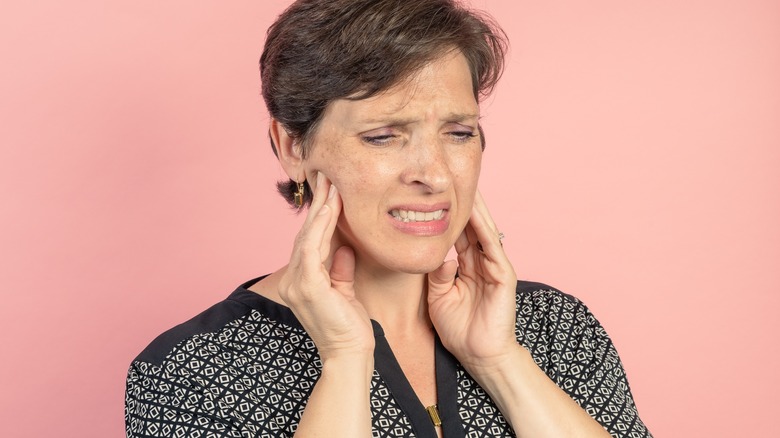Turns Out, TMJ Could Be Causing Your Migraines
Those who do not experience migraines don't always realize how debilitating they can be. In 2019, the American Migraine Foundation reported that 90% of people who experience migraines said it impacts various areas of their lives including education, career, or their social life. Yet not even 5% of affected individuals have been assessed by a physician, accurately diagnosed, and given treatment for migraine headaches.
Characterized by an intense pulsing or throbbing sensation usually isolated to one side of the head, the Cleveland Clinic states that triggers for migraines can vary. While the exact cause of the condition is unknown, such contributing factors may include weather changes, smoking, hormonal shifts, stress, caffeine consumption, and more. In addition, some experts report a potential connection between TMJ disorders and migraine headaches (via Self).
Hinging your lower jawbone to your skull, the temporomandibular joints (TMJ) allow the jaw to move about freely such as when we're talking, yawning, or chewing, reports Johns Hopkins Medicine. However, improper alignment within the jaw can lead to some potentially painful side effects.
What is the trigeminal nerve?
TMJ disorders can impact the temporomandibular joints, surrounding nerves, and jaw muscles (via Johns Hopkins Medicine). While this often produces facial pain, what's the connection between TMJ and the head pain we experience with migraines?
"The muscles that are connected to the [temporomandibular] joint can go into spasm with increased use—from talking, chewing, yawning widely, those kinds of things—and [those spasms] can trigger headaches," neurologist and headache specialist Dr. Belinda A. Savage-Edwards tells Self. "But it's been shown that people with TMJ disorders are actually more prone to migraine headaches than tension headaches."
Experts say the explanation for this link may lie in the body's trigeminal nerve, a nerve which has been tied to both jaw mobility and head and facial pain (per Self). Excellence in Dentistry further explains, saying that overuse of the jaw or the misalignment of jaw muscles due to a TMJ disorder can place strain on the trigeminal nerve, potentially provoking migraine symptoms.
So how can you be sure that your jaw is responsible for your migraine? Dr. Savage-Edwards tells Self that if your migraine is accompanied by jaw pain, stiffness, or cracking or popping of the jaw, you may be experiencing a TMJ disorder. Subsequently, treating the disorder may potentially help relieve migraine symptoms as a result.


